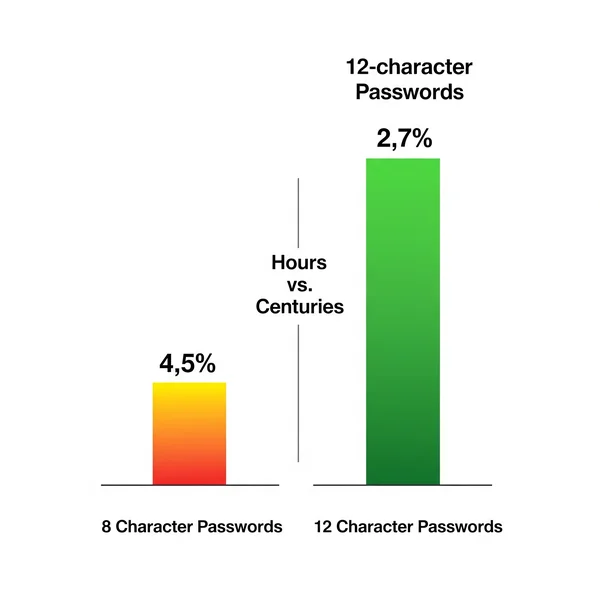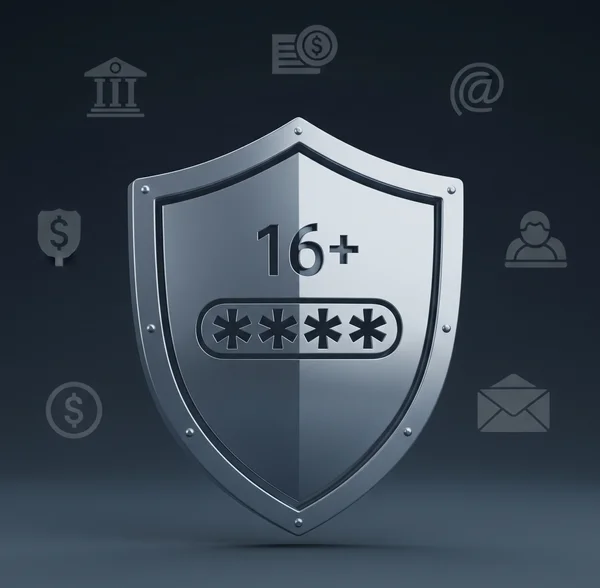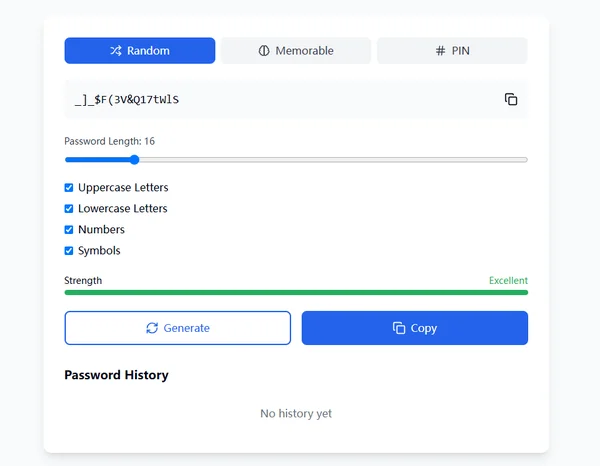How Long Should Your Password Be? 8, 12, 16+ Characters
When it comes to crafting a strong defense for your online accounts, password length is undeniably one of the most critical factors. Yet, it's also a source of common confusion. How long should your password be to ensure adequate password security? Is an 8 character password still acceptable, or should you be aiming for a 12 character password, a 16 character password, or even longer? This article will crack the code on password length, explaining how it impacts security against modern threats and providing clear recommendations. Ready to find your security sweet spot? You can always use our tool to generate passwords of optimal length.
Why Password Length is a Critical Security Metric
Before diving into specific numbers, it's crucial to understand why password length is such a vital security metric. The primary threat that length counters is the brute-force attack. What is a brute-force attack?
Brute-Force Attacks Explained: How Length Thwarts Hackers
A brute-force attack is where an attacker uses automated software to try every possible combination of characters until they guess your password. The more characters your password has, the more combinations exist.
The Exponential Power of Each Additional Character
The key takeaway is that the number of possible passwords increases exponentially with each character added. If you have a password using uppercase letters, lowercase letters, numbers, and symbols (a character set of, say, 70+ possibilities), adding just one more character multiplies the total combinations by over 70. This is why even a small increase in password length can have a massive impact on security.

Understanding Password Cracking Times in Real Terms
While exact password cracking times vary based on the attacker's computing power and the password's complexity, longer passwords invariably take exponentially longer to crack. A short, simple password might be cracked in seconds or minutes; a long, complex one could take centuries or even millennia with current technology, rendering brute-force attacks impractical.
The 8-Character Password: Still Secure in 2024?
For many years, an 8 character password was often cited as a minimum requirement by various online services. But is 8 characters enough for a password in today's digital landscape?
Historical Context: Why 8 Characters Was Once a Standard
The 8-character standard emerged in an era of less powerful computing. At the time, it offered a reasonable level of protection against the prevalent threats. Many older systems were also designed with 8-character limits.
Modern Threats: Can an 8 Character Password Be Cracked Quickly?
Unfortunately, with the dramatic increase in computing power available to attackers (including specialized hardware and cloud computing), an 8 character password, especially if it lacks full complexity (all character types), can often be cracked relatively quickly – sometimes in hours or even minutes. For robust account security, it's generally no longer considered sufficient for most important accounts.
When an 8-Character Password Might Be Barely Acceptable
An 8 character password might offer minimal protection for very low-risk accounts where a breach wouldn't have significant consequences, provided it uses maximum complexity (all character types) and is absolutely unique. However, for any account containing personal data, financial information, or access to other services, an 8 character password falls short of modern password best practices.
Stepping Up: The Security Benefits of a 12-Character Password
Moving to a 12 character password represents a significant enhancement in security over shorter alternatives. What's a good 12-digit password's strength?
Significant Leap in Cracking Difficulty Over 8 Characters
The jump from 8 to 12 characters, assuming similar complexity, increases the number of possible combinations by an enormous factor. This pushes the estimated cracking time from potentially hours or days for an 8-character password to potentially many years or even centuries for a 12 character password, making it a much more formidable barrier for attackers.

Meeting a Common Modern Recommendation for Secure Password Creation
Many current security guidelines, including general interpretations of NIST password guidelines, suggest that 12 characters is a good baseline for creating a secure password. It provides a substantial level of protection against common brute-force attacks.
Balancing Security and Usability with a 12 Character Password
A 12 character password, while more complex to remember than an 8-character one, is still manageable if using a memorable passphrase approach or, ideally, stored in a password manager. It offers a good balance between strong security and practical usability for many users. You can easily create a 12 character password with various options using a generator.
Maximum Protection: The Case for 16+ Character Passwords
For those seeking the highest level of password security, especially for critical accounts, aiming for a 16 character password or even longer is the recommended approach. Is a 16 character password strong? Absolutely.
Achieving Top-Tier Resistance to Brute-Force Attacks
A 16 character password that utilizes a full mix of character types is exceptionally resistant to brute-force attacks with current and foreseeable technology. The sheer number of permutations makes it computationally infeasible for attackers to crack within any practical timeframe.
Why 16 Character Password (and longer) are Recommended for Critical Accounts
Your most important accounts – primary email, online banking, password manager master passwords, cloud storage with sensitive data – warrant the strongest possible protection. For these, a 16 character password (or longer) provides peace of mind and a robust defense.

The Role of Password Managers in Handling Longer Passwords
The main challenge with such long passwords is memorization. This is where password managers become essential. They can securely store and auto-fill these ultra-strong credentials, meaning you only need to remember one strong master password.
Beyond Just Length: Complexity and Randomness Still Matter
While this article focuses on password length, it's crucial to remember that length alone isn't the sole determinant of a secure password. It works in tandem with complexity and randomness.
How Character Variety (Complexity) Multiplies Strength
Using a mix of uppercase letters, lowercase letters, numbers, and symbols (high complexity) drastically increases the number of possibilities for each character position in your password, further multiplying its overall strength. A 12-character password with all character types is far stronger than a 12-character password with only lowercase letters.
Why a Long, Predictable Password Can Still Be Weak
A long password like "thisisareallylongpasswordforexample" is still weak because it uses dictionary words and is predictable. Randomness ensures there are no discernible patterns for attackers to exploit.
Aiming for Long, Complex, AND Random Passwords
The gold standard is a password that is long, uses all character types, and is truly random. This combination offers the best defense. Learn more about creating strong passwords here.
How Our Password Generator Helps You Achieve Optimal Length
Our strong password generator is designed to make achieving optimal password length and other security characteristics effortless.
Easily Selecting Your Desired Password Length with Our Tool
Our tool features a clear slider or input field, allowing you to precisely select your desired password length, from shorter options (though not recommended for high security) up to very long passwords for maximum protection.

Generating 12 Character Passwords, 16 Character Passwords, and More
Whether you need a password generator 12 characters long, a password generator 16 characters long, or even more, our tool can instantly create them according to your specifications, ensuring they also meet complexity requirements if you enable all character types.
Combining Optimal Length with Other Security Features
When you generate strong password options with our tool, you're not just getting length; you're also getting the benefits of randomness and customizable complexity, all contributing to a robust final password.
Choosing the Right Password Length for Your Needs
The answer to "how long should your password be?" isn't one-size-fits-all, but the clear trend is towards longer passwords for better password security.
- An 8 character password is generally too short for secure use in 2024.
- A 12 character password offers a good balance of security and usability for many accounts.
- A 16 character password or longer provides top-tier protection, especially for critical accounts, and is best managed with a password manager.
Ultimately, choose a password length that reflects the sensitivity of the account it protects, always aiming for longer and more complex where feasible. Using a reliable online password tool removes the guesswork.
What password length do you usually aim for, and why? Share your thoughts in the comments!
Password length questions answered: your top questions answered
Q1: What does NIST say about minimum password length?
A: The NIST password guidelines (specifically SP 800-63B) emphasize memorized secrets (like passwords) should be at least 8 characters if chosen by the user. However, for machine-generated passwords (like those from a strong password generator), they can be shorter (e.g., 6 characters) if they are truly random and system-generated. Crucially, NIST also strongly recommends using longer passphrases and supports the use of password managers, which facilitate much longer, complex passwords. Many interpret their overall guidance as encouraging lengths well beyond 8 characters for user-chosen or high-security passwords.
Q2: Is a 10-character password significantly better than an 8?
A: Yes, every additional character adds exponential strength, assuming similar complexity. A 10-character password offers significantly more combinations than an 8 character password, making it harder to brute-force. While 12 or more is better, 10 is a definite improvement over 8.
Q3: Can a password be too long?
A: From a pure security perspective against brute-force, longer is almost always better. However, extremely long passwords (e.g., 50+ characters) can become impractical to manage even with a password manager and may hit arbitrary limits set by some websites. For most practical purposes, a strong password in the 16-25 character range generated by a reliable password generator is more than sufficient.
Q4: If my password is long, do I still need special characters?
A: Yes, for optimal security. While a very long password made only of letters and numbers is stronger than a short one with special characters, the ideal is both length and complexity (including special characters). Each character type you add to the mix exponentially increases the password's strength for any given password length.
Q5: How do I choose the length on your strong password generator?
A: Our password generator provides a simple slider or input field labeled "Password Length." You can easily adjust this to your desired number of characters, whether you need a 12 character password, a 16 character password, or any other custom length.